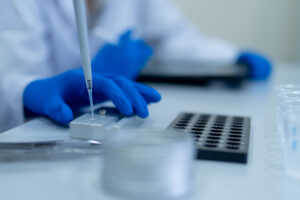What is DNA testing?
DNA testing is a type of genetic testing. It is a medically-based test to analyze DNA components. You can voluntarily decide to have your DNA tested if there is something you wish to know.
There are currently thousands of types of genetic tests in use, with more being developed continuously. Some are popular for personal interests such as genealogical tracing and ancestry studies, while others are used to determine medical and health-related results.
How does it work?
In most types of DNA testing, samples of either hair, fingernail, skin, blood, or saliva are taken.
This can be done in a laboratory, with your healthcare provider, or, quite often, at home. The samples are then sent in for analysis.
For at-home DNA testing, what you will most often start with is a user-friendly kit. There are quite a few companies that offer this type of kit for paternity, genealogy, or disease screening purposes. Mostly, DNA sample collection, certainly the at-home type, is relatively or entirely painless and usually non-invasive. Certain types of DNA samples will remain usable for many years if handled and stored properly. Most kits of that type will of course come with instructions to guide you through the process of collection, storage, and dispatch of the DNA samples.
Using the DNA in these physical specimens, the structure of the genome can be analyzed. Changes, sequences, or markers can be identified in chromosomes, genes, or proteins.
What is the correct legal approach to DNA testing?
If you are collecting DNA samples with a view to using them as material in a legal or court case, they will most likely need to be collected by a professional in an officially recognized laboratory. Home tests are for your knowledge and cannot be used for any other purpose.
Additionally, you must gain consent in order to do any DNA testing if the DNA samples are from a person other than yourself.
If the sample is taken from a child, underage person, or any individual who cannot consent, you must get written consent from the person’s legal guardian or parent.
What is DNA?
DNA is a self-replicating material known as deoxyribonucleic acid. This molecule contains within it tightly packed instructions that almost every living creature needs to grow, develop, stay alive and healthy, and reproduce. DNA is found in every cell of nearly every organism. It is passed from parents to children.
As tiny as DNA is, it is composed of four even smaller pieces, the four “bases”: adenine, cytosine, guanine, and thymine. The order in which these bases appear is called a sequence. This configuration sets up the instructions for the entire body, from prenatal development to reproduction and on and on.
All of these components form a unique two-stranded DNA molecule that takes the shape of a double helix. If you aren’t familiar with the double helix, essentially it looks like a ladder wrapped around an invisible bar.
Who should get DNA testing? And why?
DNA testing can help evaluate a developing fetus for the probability or certainty of health issues or genetic syndromes, both rare and common. This is known as prenatal testing, which can come in the form of amniocentesis, chorionic villus sampling, or non-invasive prenatal testing (NIPT).
Genetic testing can also help identify cancer before it would appear on other types of tests. This allows patients to receive critical care and take charge of their health and their plan to mitigate and fight the disease. So, if medical professionals note warning signs of what looks like cancer, they might refer a patient for DNA testing.
It can also be used to show the likelihood of a child’s paternity or parentage, trace and narrow down a person’s ancestry, or show the percentage of probability that an individual was connected to a crime where traces of DNA were left.
Beyond paternity tests, sibling DNA testing is another method to determine familial relationships.
What do the different testing types examine?
Gene tests, otherwise known as molecular genetic tests, can analyze short lengths of DNA, or single genes, in order to identify changes or variations that can lead to or indicate a genetic condition or syndrome.
Chromosomal genetic tests look at whole chromosomes or longer lengths of DNA to explore whether there are larger genetic discrepancies. For instance, an extra copy of a chromosome, or a missing chromosome, could cause a genetic disorder.
Another type of DNA testing is what is known as the biochemical genetic test, which can look at the activity level of the amount of proteins in the DNA. Irregularities in either amount or activity can mark DNA changes that indicate a genetic syndrome or disorder.
Is DNA testing right for me?
DNA contains the coding for every part of a person’s body.
Is there something you need to know about your code and what it might mean for you? The best place to start to discover this is through genetic counseling – connecting with a genetic counselor can help you understand if genetic testing is right for you, and which type of testing to consider.
A one-on-one session with a genetic counselor will enrich your understanding on certain symptoms that can potentially affect you or your family. These symptoms may be one of the features of a rare disease including Smith-Lemli-Opitz syndrome and others. Make sure to speak with a genetic counselor for more information.



